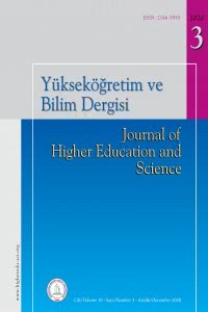Bir Öğretmen Eğitim Programında Öğrencilerin Eğitim ve Öğretim Kalitesi Hakkındaki Algıları
Bu araştırmanın amacı, bir öğretmen eğitimi programında öğrencilerin eğitim ve öğretim kalitesi hakkındaki algılarını incelemektir. Bu amaç doğrultusunda, Özcan 2013 tarafından Türkçe’ye uyarlanan ve geçerlik güvenirlik çalışmaları tamamlanan “Öğrencilerin Ders Deneyimleri Ölçeği” kullanılmıştır. Ayrıca, öğrenme-öğretme süreçlerinin kalitesi ile ilgili detaylı görüş almak amacı ile açık uçlu sorulardan oluşan çevrimiçi yarı yapılandırılmış bir görüşme formu öğrencilere yöneltilmiştir. Araştırmaya, özel bir üniversitenin pedagojik formasyon sertifika programına kayıtlı olan 74 öğrenci katılmıştır. Nicel verilerin analizi için t-testi ve tek yönlü varyans analizi, nitel verilen analizi için içerik analizi kullanılmıştır. Öğrencilerin eğitim ve öğretimin kalitesine ilişkin algıları cinsiyetlerine veya mezun oldukları programa göre anlamlı farklılık göstermemiştir. Verilerden elde edilen bulgular, öğrencilerin ihtiyaç duydukları ve hangi alanlarda yetkin olduklarını da içerecek şekilde, öğrencilerin algılarının ve öğrenme sürecinin kalitesinin anlaşılması ile ilgili ipuçları vermektedir. Bu çalışmanın bulguları, öğretmen yetiştirme programları, kurumları ve öğretim kadrosu için anlayış sağlamaktadır. Bu çalışma aynı zamanda nitelikli ve yeterli öğretmen yetiştirmek için dikkate alınması gereken faktörleri tartışmaktadır
Anahtar Kelimeler:
Eğitim kalitesi, Öğretim kalitesi, Öğretmen yetiştirme programı, Öğrenci algıları
Students’ Perceptions of Education and Teaching Quality in a Teacher Training Programme
The aim of this study is to examine students’ perceptions about the quality of education and teaching in a teacher education program. For this purpose, “Student Course Experience Scale“ which was adapted to Turkish by Özcan 2013 and whose validity and reliability studies were completed was used. In addition, an online semi-structured interview form consisting of open-ended questions was used to get detailed views of students on the quality of learning-teaching processes. The study included 74 students enrolled in a pedagogical formation certificate program of a private university. For quantitative analysis, t-test and one-way ANOVA for independent samples were used, and for qualitative analysis, content analysis was used. Student perceptions of education and teaching quality did not differ significantly according to their gender or graduated programme. Findings from the data provide clues about student perceptions and understanding of the quality of their learning process, including where they need support, and in which areas they feel competent. The findings of this study provide insights for teacher training programmes, institutions, and teaching staff. This study also discusses the factors that should be considered for educating qualified and competent teachers
___
- Avcı-Yücel Ü. (2017). Perceptions of pedagogical formation students about web 2.0 tools and educational practices. Education and Information Technologies, 22(4), 1571-1585.
- Avcı-Yücel Ü., & Koçak-Usluel Y. (2016). Knowledge building and the quantity, content and quality of the interaction and participation of students in an online collaborative learning environment. Computers & Education, 97(1), 31-48.
- Adnot, M., Dee, T., Katz, V., & Wyckoff, J. (2016). Teacher turnover, teacher quality, and student achievement in DCPS. Educational Evaluation and Policy Analysis, 39(1), 54–76. doi 10.3102/0162373716663646
- Aguti, B., Walters, R. J., & Wills, G. B. (2014). Effective use of e-learning technologies to promote student-centered learning paradigms within higher education institutions. International Journal for e-Learning Security, 4(3/4), 391–398.
- Akareem, H. S., & Hossain, S. S. (2016). Determinants of education quality: What makes students’ perception different? Open Review of Educational Research, 3(1), 52–67.
- Altbach, P. (2006). The dilemmas of ranking. International Higher Education, 42(1), 1–2.
- Başbay, M., Ünver, G., & Bümen, N. T. (2009). Ortaöğretim alan öğretmenliği tezsiz yüksek lisans öğrencilerinin öğretmenlik mesleğine yönelik tutumları: Boylamsal bir çalışma. Kuram ve Uygulamada Eğitim Yönetimi, 59, 345–366.
- Brennan, J., & Teichler, U. (2008). The future of higher education and the future of higher education research. Higher Education, 56(3), 259–264.
- Tamim, R. M., Colburn, L. K., & Karp, K. (2016). High quality teachers for high impact learning. In Michelli et al. (Eds.), Teacher quality and teacher education quality: Accreditation from a global perspective (pp. 3–18). New York: Routledge, Taylor & Francis.
- UNICEF (2000). Defining quality in education. A paper presented at the meeting of The International Working Group on Education Florence, Italy, UNICEF.
- Üstünlüoğlu, E. (2016). Teaching quality matters in higher education: A case study from Turkey and Slovakia. Teachers and Teaching, 23(3), 1–16.
- Wang, L., & Xiao, W. (2017). Higher education development and regional differences in China. Eurasia Journal of Mathematics, Science and Technology Education, 13(10), 6689-6698.
- Wei C. C., & Ramalu S. S. (2011). Students satisfaction towards the university: Does service quality matters? International Journal of Education, 3(2), 1-15.
- Yin, H., Lu, G., & Wang, W. (2014). Unmasking the teaching quality of higher education: students’ course experience and approaches to learning in China. Assessment & Evaluation in Higher Education, 39(8), 949–970.
- Yin, H., Wang, W., & Han, J. (2016). Chinese undergraduates’ perceptions of teaching quality and the effects on approaches to studying and course satisfaction. Higher Education, 71(1), 39–57.
- Zheng, J. (2016). Evaluating teaching quality in higher education: Analytical modelling and computerized implementation. International Journal of Security and Its Applications, 10(2), 197–204.
- ISSN: 2146-5959
- Yayın Aralığı: Yılda 3 Sayı
- Başlangıç: 2011
- Yayıncı: Bülent Ecevit Üniversitesi (Önceden Zonguldak Karaelmas Üniversitesi)
Sayıdaki Diğer Makaleler
Hemşirelik Eğitim Müfredatı ve Öğrenme Çıktıları
Özlem İBRAHİMOĞLU, Sevinç MERSİN, Hülya SARAY KILIÇ
Türkiye ve İngiltere Doktora Programlarının Karşılaştırılması
Saadet aylin YAĞAN, Zühal ÇUBUKÇU
Halise ŞEREFOĞLU, Türkay HENKOĞLU
Matematik ile İlgili Düşünceler Ölçeğinin Geçerlik ve Güvenirlik Çalışması
